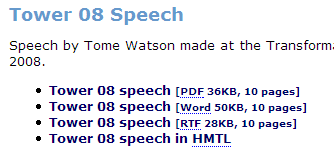I think we got away with it. The remit for the week had been pretty straightforward: design, install, build, populate, edit and operate a website for the Progressive Governance Summit of 20-ish world leaders. So yeah, I’ve been busy.

It became an exercise in ‘web 2.0’ – open source tools, free online services, RSS feeds, and a willingness to experiment. Arguably, that’s really the only way it could have worked. And the fact that it did work says as much about the culture change brought about by the new technology, as it does about my own (questionable) skills.
On the day itself, I concentrated my efforts on the ‘live video blog’: streaming video broadcast from inside the summit itself, with my live commentary alongside. To my mind, the former is probably more important than the latter. You could see the heads of government talking (relatively) informally, even arguing once or twice, and got a feel for their individual personalities and sincere beliefs.
But this is a blog, so let’s talk blog. There wasn’t really a plan for the ‘live blog’, and the approach changed as the morning went on. It started as a straightforward ‘this is Gordon Brown, prime minister of the UK’, with any good soundbites that caught my ear (and which I had time to transcribe correctly). But as the comments came in from ‘viewers’, it became increasingly interactive. And not just through me as host. Let me give you three examples of the social dimension.
We got a message from one viewer (blogger Ellee Seymour as it happens), complaining of sound problems. I wasn’t having issues, but I asked the audience. A stream of responses came back: no, not me, fine here, etc etc. Ellee turned it off and on again (or something), and lo, her problem was solved. The audience was providing its own tech support.
Then somebody – Oli Barrett? – spontaneously started sending URLs relevant to some of the points made in discussions. Context-sensitive links, popping up in the middle of conversation… effectively making a reality of Google’s April Fool gag earlier in the week. Way to go, Oli. 🙂
And none of this would have been practical without the CoverItLive tool. Now I confess, I’d never heard of it until Wednesday night, when Paul Bradshaw left a comment on this here blog. But it was perfect: a single console for live commentary, private messages, moderation of user contributions, and (phew!) a toilet break facility, although they didn’t call it that. (They should.) It was a dream to use… and it was free of charge. I almost feel guilty.So what, you may ask. The dozens of people who watched the video, and followed the blog, probably learned a few things, and saw a side of global democracy that they’d never seen before. We had a few laughs, the majority from the comments we didn’t feel able to allow through moderation. (FYI, very few comments failed moderation… and I suspect the contributors generally knew it was coming.)
But most importantly, we proved it can be done – even with zero preparation, zero prior experience of the technology, and two administrators who (frankly) didn’t know much about the subject matter. People were able to share their thoughts, with us and with each other. Maybe it wasn’t like being there, but it was like being next door.
The precedent is hereby set. Next time, we’ll do better. We need a host who really knows the subject matter (and can type really fast). We need to get the admin console operating on several machines, and delegate the various tasks. We need to bring more coffee. And we need a way to get the chat into the meeting itself – to the conference table somehow, or into the ‘press conference’ after.
 All the while, our valiant photographer at the venue was pumping photos into the Downing Street Flickr account, which were then fed back into the summit website. The executive summaries of the various expert papers were opened for comments. And my colleague was sending out the odd Twitter flash.
All the while, our valiant photographer at the venue was pumping photos into the Downing Street Flickr account, which were then fed back into the summit website. The executive summaries of the various expert papers were opened for comments. And my colleague was sending out the odd Twitter flash.
By the summit’s conclusion, we were both tired and hungry. But every comms channel earned at least one holler of ‘bloody hell! this is fantastic!’… which, for anyone without Whitehall experience, is not common.
I’m grateful to the No10 team for letting me play with their summit. I hope we proved a few points, and learned a few lessons, which can help inform Downing Street’s future online work. Stay tuned. 😉
